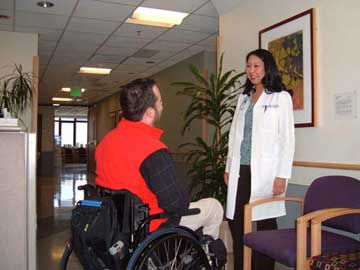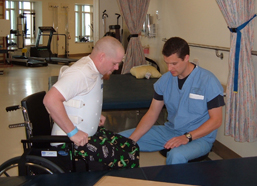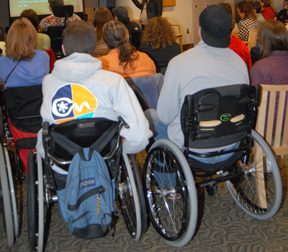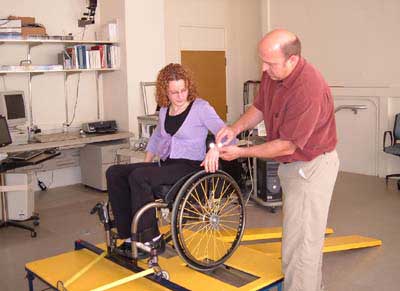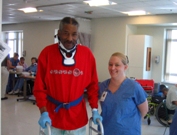Spinal Cord Injury Update
Summer 2007: Volume 16, Number 3
SCI Research: What are the Model Systems Doing?
The National Institute on Disability and Rehabilitation Research (NIDRR) funds 14 Model SCI Systems to conduct research aimed at improving the lives of individuals with SCI. Some of the studies being conducted during the 2006-2011 grant cycle are summarized below.
[Click here for a glossary of research terms.]
University of Pittsburgh Model Center on Spinal Cord Injury
• Implementation for Prevention of Upper Limb Pain in Spinal Cord Injury: A Randomized Trial. Participants in the intervention group will receive guideline-defined care, including equipment, modifications and training, to avoid upper limb (shoulder) pain, regardless of insurance. The researchers hope to show that this preventive care reduces pain and improves health, function, community participation and employment. PI: Karen Greenwald, RN, BSN, CCRC.
Midwest Regional Spinal Cord Injury Care System, Chicago, IL
• Development of Low-Cost Devices to Increase Delivery of Intensive Treadmill Training. Body-weight-supported treadmill training (BWSTT) is a therapy for improving walking ability in individuals with incomplete SCI. In BWSTT, a patient’s body is supported in a sling while therapists manually assist the patient’s legs to walk on a treadmill. This project will develop and test two low-cost motorized devices to assist with treadmill training in persons with SCI who have the potential to recover walking ability. PI: T. George Hornby, PhD.
• Disparities in Access to and Outcomes of Rehabilitation Care for Medicare and Medicaid Beneficiaries with SCI. Does a person’s age, race/ethnicity or gender have an impact on quality of care and outcomes among newly injured patients with Medicare or Medicaid insurance? Researchers hope to identify any differences in quality of care that impact both short- and long-term outcomes. PI: Anne Deutsch, PhD
Georgia Regional SCI System, Shepherd Center, Atlanta, GA
• Psychological Status During Inpatient Rehabilitation and One Year After Onset: Stress, Coping, and Expectation-Hope for Recovery. Researchers will investigate some of the ways people with new SCI adapt psychologically to their injury. PI: James Krause, PhD.
• Development and Validation of a Clinical Measure of Wheelchair Seat Cushion Degradation. What is the “lifespan” of a wheelchair seat cushion within real-world use? The investigators will develop a method to quickly and accurately determine when a seat cushion needs to be replaced. PI: James Krause, PhD.
Northeast Ohio Regional Spinal Cord Injury System, Cleveland, OH
• Trunk muscle electrical stimulation to stabilize seated posture: Effects on respiration, mobility and wheelchair function. This study uses functional electrical stimulation (FES) on the paralyzed trunk muscles of persons with SCI to improve their posture and stabilize their torsos. Researchers will then examine whether this treatment improves pulmonary function, seated interface pressures, reaching ability, and wheelchair propulsion. PI: Ron Triolo, PhD.
New England Regional Spinal Cord Injury Center, Boston, MA
• Improved Activity Limitations Assessment Using Computer Adaptive Testing. The researchers will develop and test a new measurement tool, called the Spinal Cord Injury (SCI) Computer Adaptive Test (CAT), to more accurately assess the functional status of SCI patients than the widely used Functional Independence Measure (FIM). PI: Alan M. Jette, PT, PhD.
Rocky Mountain Regional Spinal Injury System, Craig Hospital, Englewood, CO
• A Comparison of High vs. Low Tidal Volumes in Ventilator Weaning for Individuals with Sub-acute Cervical Spinal Cord Injuries. This study will compare two methods for weaning persons with tetraplegia off the ventilator in the first two weeks to six months after injury. The goal is to improve and standardize the procedure for helping patients become ventilator independent. PI: James Fenton, M
University of Alabama at Burlington (UAB) Model SCI Care System
• The Effect of Nicotine on Spinal Cord Injury Pain: A Randomized, Double-Blind, Placebo-Controlled Trial. What are the effects of nicotine on SCI pain? Findings will help clinicians improve treatment of pain and counsel persons with SCI about the negative effects of tobacco. PI: J. Scott Richards, Ph.D.
• The Use of Neurologic Examination to Predict Awareness and Control of Lower Urinary Tract Function post SCI. This study will investigate how key parts of the neurological exam can be used to more accurately determine the potential for sensation of bladder fullness and ability to voluntarily control urinating. The long term goal is to allow the researchers to develop better methods for management of the neurogenic bladder. PI: Marca L. Sipski, MD.
Northern New Jersey Spinal Cord Injury System, West Orange, NJ
• Prevention of Long-Term Respiratory Complications of SCI: A Randomized Controlled Trial. Respiratory illnesses such as pneumonia are the leading cause of death in SCI, partly due to weakened chest and abdominal muscles necessary for deep breathing and coughing. Two different assisted cough techniques will be compared to determine which is more effective in preventing community acquired pneumonia and other severe respiratory complications in persons with chronic SCI. PIs: John Bach, MD, & Steven Kirshblum, MD.
University of Michigan Model SCI Care System, Ann Arbor, MI
• Assessment of the Efficacy of Venlafaxine HCI as a Preventative Therapy for Depression and Pain Following New Spinal Cord Injuries: A Randomized Clinical Trial. Depression after SCI can interfere with adjustment and learning new self-care routines. This study will compare the antidepressant venlafaxine (Effexor XR) to placebo in SCI patients who are depressed during the first year after injury. The researchers hope to learn whether the antidepressant improves mood, pain, health, independence and quality of life. PIs: Denise Tate, MD, and Anthony Chiodo, MD.
Northwest Regional Spinal Cord Injury System, Seattle, WA
See the Winter 2007 SCI Update Newsletter for descriptions of our current research projects.
Glossary of research terms*
- Clinical trial: a scientifically controlled study of the safety and effectiveness of a therapeutic intervention.
- Control/controlled trial: a standard against which experimental observations may be evaluated. In clinical trials, one group of participants is given an experimental intervention, while another group (i.e., the control group) is given either the standard treatment or a placebo.
- Double-blind: neither the participating individuals nor the study staff know which participants are receiving the experimental intervention and which are receiving a placebo.
- Intervention: the treatment being studied, such as a drug, device or procedure.
- Outcome: an effect or result (such as a symptom or illness) that is being observed or measured to determine the effectiveness of an intervention.
- PI: Principal Investigator; the researcher in charge of a study.
- Placebo: an inactive substance (pill, liquid, powder) that has no treatment value but is used to compare to an intervention to assess the intervention’s effectiveness.
- Randomized clinical trial (RCT) or randomized trial: A study in which participants are randomly (i.e., by chance) assigned to one of two or more treatments (or placebo) in a clinical trial.
*Adapted from http://ClinicalTrials.gov.

